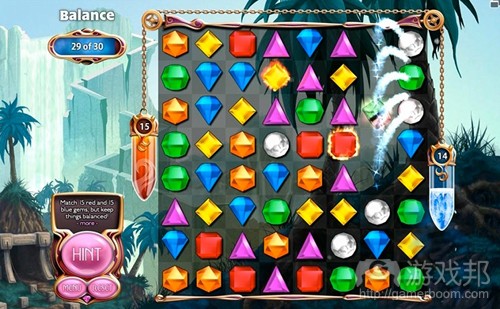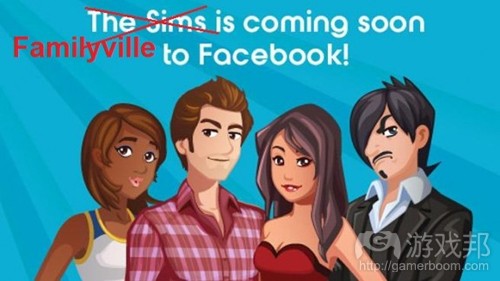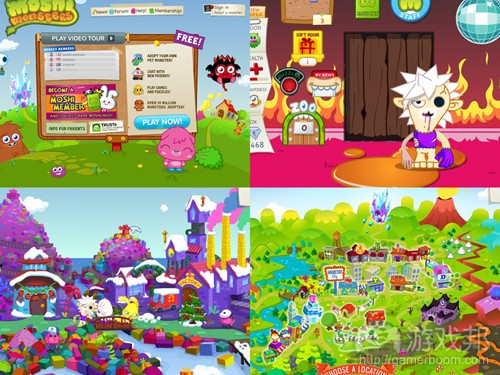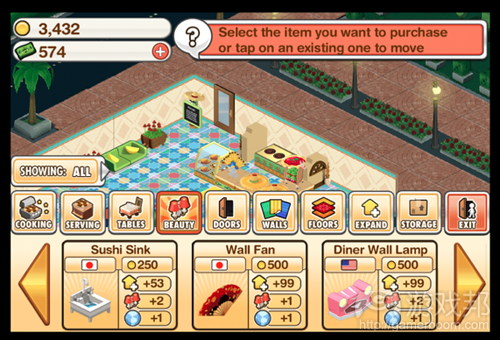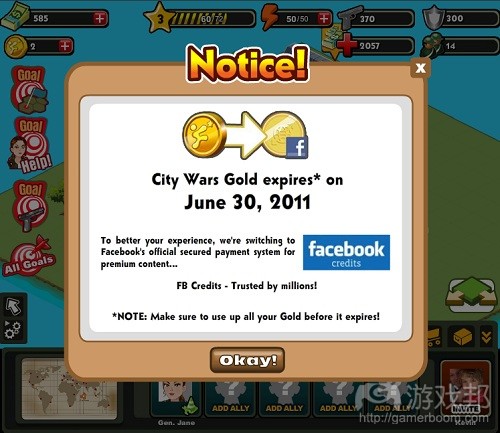每日观察:关注Zynga新作“FamilyVille”传言(6.27)
1)据venturebeat报道,知情人透露有意收购休闲游戏公司PopCap Games的买主有可能是EA,但ThinkEquity调研分析师Atul Bagga认为,EA和动视暴雪这两家游戏发行商都不太可能是买家,因为EA主要关注社交游戏公司,而动视暴雪则以硬核游戏为重心,而中国公司在收购交易上出手并不阔绰。
Zynga也同样不可能是候选人,该公司庞大的用户基础足以令其在一年内收购12家公司,它目前正因忙于推出原创新作而无暇顾及其他;迪士尼也同样不可能,但福克斯这样的公司也许有可能介入。日本DeNA同样也要排除在外,因为该公司正力争超越Zynga,打造顶级的手机社交游戏帝国。
在EA或以10亿美元以上的价格收购PopCap的消息后,EA股票比上周三收盘时的22.54美元下跌了3.5%,目前股价是21.76美元。但PopCap高管Jennifer Kye最近在Twittr上声称PopCap首席执行官并未向其确认公司将被收购的消息。PopCap至今也并未向媒体的询问作出任何回复。
PopCap是最成功的独立游戏公司之一,去年总营收超过1亿美元,其中《宝石迷阵》占其收益的40%,还有20%收益来自《植物大战僵尸》。该公司当前在Facebook上共有1630万MAU,430万DAU,排名仅次于Zynga和EA。
2)AppData数据显示,Zynga新作《Empires & Allies》发布25天用户规模已超过《FarmVille》,目前MAU总数已增长至3900万。该游戏平均每天获取100万新用户,每周新增用户800万。
Zynga另一款热门游戏《CityVille》目前在Facebook仍有8800万用户,《FarmVille》用户为3880万,该公司目前用户总数为2.69亿。
3)据fusible观察,familyville.com域名权已经从原来的持有人Internet Computing移交给Rob Holmes(IPCybercrime公司CEO及创始人),后者曾在2010年6月助Zynga购得cityville.com域名权,Zynga随后就推出了首款在Facebook上突破1亿MAU的大作《CityVille》,所以fusible据此推测Zynga的下一款新游戏有可能就是“FamilyVille”。
再联想到EA不久前宣布将《模拟人生》的Facebook版本《The Sims Social》,所以fusible预感“FamilyVille”可能就是Zynga回应EA举动的一款生活题材的模拟游戏。
目前Zynga尚未在美国注册familyville的商权,但这一点并不反常,因为Zynga新作《Empires and Allies》也是直到发布后才进行商标注册。
4)DFC Intelligence最新报告预测,2016年全球在线游戏市场规模将达290亿美元,比2010年的157亿美元增长84%。该报告指出,PC平台的在线游戏将创造2016年游戏产业的大部分收益(约占88%,共230亿美元),其中170亿美元来自订阅付费渠道,在线使用和虚拟商品交易。
5)Spark Ventures PLC最近宣布出售在Mind Candy(《Moshi Monsters》开发商)一半的股份,Mind Candy目前身价已达2亿美元。
Mind Candy所开发的专注于儿童用户的《Moshi Monsters》自2008年上线以来注册用户已超过5000万,该公司成员约70人左右,它推出的另一款知名游戏是《Perplex City》。Spark本次出售股权获得了1400%的投资回报,它还曾向休闲社交游戏门户网站OMGPOP和手机游戏开发商Twistbox投资。
6)游戏发行商MindJolt在收购Social Gaming Network(SGN)两个月之后,终于在近日发布SGN首款iOS版本的手机社交游戏《Mini Café》。MindJolt首席运营官Colin Digiaro表示,SGN将于未来六个月内继续发布五六款手机游戏,未来有可能推出《Mini Café》的Android版本;该公司目前共有2500万月独立访问用户。
7)《City Wars》是一款由Funstar Studios开发的战争题材的城建游戏,据AppData数据显示,该游戏自2月份发布以来,用户数量一直稳定增长,它最近的MAU是81万940,DAU是5万3690。
《City Wars》由建设城市和进攻他人这两大要素组成,其中的建设包括三种类型:生产、经济和装修。在生产建设过程中,玩家可生产可防御敌人进攻的道具,经济建设则可保障收入来源,而装修建设则纯粹提供艺术欣赏价值。
该游戏的社交元素包括传统的访问好友基地设置,如果玩家修缮好友的建筑,还可以获得经验值和其他奖励,除此之外,它还支持玩家之间相互交换礼物。这款游戏目前使用的仍是自己的“硬通货”Gold,但要求所有玩家在6月30日前将Gold全部花完,因为该货币不可直接兑换为Facebook Credits。
8)据Allfacebook报道,Facebook开发者论坛最近充斥大量抱怨的声音,不少开发者声称Facebook在未事先通知的情况下关闭了他们的应用,甚至他们的项目运营严重受挫。
据Facebook所称,他们采取这一措施的原因是,有不少用户投诉某些应用具有滥发垃圾信息的嫌疑,为了增加用户满意度Facebook不得不有所行动;Facebook已为开发者发布一条链接地址,以便认为自己无端遭殃的开发者向Facebook提出申诉,Facebook目前也正创建新型分析工具以助开发者更好地监测消极用户反馈,以免自己的产品失去用户信赖。(本文为游戏邦/gamerboom.com编译,如需转载请联系:游戏邦)
1)Rumor factory churns on: EA now potential buyer for casual game maker PopCap
Matthew LynleyAdd
Game publisher Electronic Arts is the latest rumored suitor looking to buy casual games maker PopCap for more than $1 billion, according to sources talking to TechCrunch’s Jason Kincaid.
As usual, the sources are remaining anonymous, so take the rumors with a grain of salt. The purchase price is also somewhere between 10 and 20 times PopCap’s yearly revenue, which is a pretty steep price even for bold suitors. The company recently acquired the San Francisco-based social game developer ZipZapPlay and said it was planning to go public later this year as well.
PopCap is an appealing target for almost any game company because it has several extremely popular games that can be turned into franchises. The company also has a large number of regular users who purchase games, and it is expanding into social gaming with games like Bejeweled Blitz. It’s a rare company that draws gamers from all audiences — social, casual, mobile and hardcore gamers.
Game publishers Electronic Arts and Activision Blizzard are unlikely suitors, ThinkEquity research analyst Atul Bagga said. EA already tried buying a social gaming company, and Activision Blizzard is focused mainly on hardcore gamers. There’s a chance a Chinese company might come in and try to buy PopCap, but those companies are usually pretty stingy when they make acquisitions, Bagga said.
Zynga, which has wildly popular social games like Farmville and CityVille, is also an unlikely candidate. Zynga has also been on a spending spree — its huge user base has allowed it to buy 12 companies in 12 months. But Zynga already has 259 million monthly active users and is known for rapidly turning out new intellectual property.
“That leaves Japanese guys like DeNA and maybe a few media companies,” Bagga said. “It won’t be Disney, obviously, though there’s a chance a company like Fox might be involved.”
Japan-based DeNA, which focuses on social games and has taken aim at Zynga, has been growing at a blistering pace and could be on track to unseat Zynga as the top developer of social games for mobile devices.
Whether you believe the EA rumor or not, it has led investors to cash out of the massive publisher. Shares of Electronic Arts were down 3.5 percent to $21.76, down from a closing price of $22.54 on Wednesday. Shares of Electronic Arts fell around 2 percent in extended trading on Wednesday when rumors about a potential buyout for PopCap surfaced.
PopCap’s soon-to-be customer engagement leader Jennifer Kye said the rumor was unfounded on her Twitter account. Kye said her boss confirmed to her that the company was not planning to sell to any other company for $1 billion. When contacted directly by VentureBeat, PopCap did not give any comment as to whether the rumor about the buyout was true or not.
The casual game maker reported more than $100 million in revenues last year and is one of the most successful independent game companies. Sales of Bejeweled made up about 40 percent of its revenues, and about 20 percent came from Plants vs Zombies, PopCap chief executive Dave Roberts told VentureBeat. But the company was born in 2000, long before the era of social gaming.
PopCap has 16.3 million monthly active users on Facebook. The company has 4.3 million daily active users, or those who come back once a day. It ranks No. 3 behind Zynga and Electronic Arts, according to AppData.(source:venturebeat)
2)Zynga’s Empires & Allies tops FarmVille in just 25 days
Dean Takahashi
Zynga’s Empires & Allies social game has grown to more than 39 million users in 25 , topping the audience for Zynga’s huge hit FarmVille, according to market analyst AppData.
That makes Empires & Allies, a combat strategy social game with cute cartoon graphics, one of the fastest-growing games in history. It will also enable Zynga to show that it can produce consistent hits — something that is important considering Zynga is reportedly poised to file papers for an initial public offering any day now.
Public markets like predictable performance, and Zynga’s latest game is gaining new users at a rate of a million a day and 8 million a week now, AppData shows. As we’ve said before, the company has become a Facebook distribution powerhouse like no other game company. That makes it a lot easier for Zynga to generate revenue, since a percentage of users usually pays for items in otherwise free games.
Before Empires & Allies took off, Zynga’s CityVille, which still has 88 million users on Facebook, saw similar spectacular growth. And before that, Zynga’s FarmVille, which has 38.8 million users, was the huge hit. Empires & Allies is described as CityVille meets Risk. Just two weeks, ago, Zynga had 249 million monthly active users on Facebook. Now it has 269 million.
The overall Zynga growth rate is slowing somewhat, but it shows how much Zynga’s audience can swing in a matter of weeks.(source:venturebeat)
3)Will Zynga give The Sims on Facebook a run for its money with Familyville?
Electronic Arts is making some big waves in the social gaming world this week amid rumors the company is buying PopCap Games a direct competitor of Zynga. But that’s not the only news regarding EA and social gaming. In the fierce competition for the next top game title on Facebook, EA announced that it would be bring the world’s most popular life simulation game “The Sims” to the world’s biggest social network “Facebook”.
You read it here first: After some domain name sleuthing, I have strong evidence that Zynga will answer EA’s challenge with its own yet-to-be released life simulation game on Facebook called Familyville.
That’s right Zynga fans, along with other blockbuster titles like Cityville and Farmville, Zynga may be launching Familyville sooner than later in response to EA’s announcement in early June.
Some Whois history and recent name server changes on the domain name Familyville.com are what lead me to believe that Zynga is working on its next mega hit.
Whois History
In March 2011, ownership of the domain familyville.com changed from its previous owner (Internet Computing) to Rob Holmes – founder & CEO of IPCybercrime, the very same company that acquired the domain cityville.com on behalf of Zynga for $38,225 at Moniker in June 2010.
Cityville went on to become the first game in Facebook history to reach 100 million monthly active users.
In late April though, the Whois record switched again, this time to GoDaddy’s Domains by Proxy, a Whois privacy service regularly used by Zynga for many of its domain names such as rewardville.com.
Nameserver change
Another change occurred just this week, with the domain name changing from its previous name server to COTDNS.NET, the same nameserver where many of Zynga’s most popular domains reside, including rewardville.com and hangingwithfriends.com.
The Sims Social on Facebook hasn’t been released just yet.
But if this rumor of mine proves to be true, EA may want to speed things up a bit on Facebook.
As of today, Zynga has not filed for a trademark on the word familyville in the U.S. or Europe. But there’s nothing odd about that; Zynga didn’t file for a trademark on Empires and Allies until shortly after its launch. (source:fusible)
4)Analysts: Online Games Market Will Nearly Double By 2016
by Frank Cifaldi
Analysts at DFC Intelligence are estimating that revenues for the worldwide online gaming market will reach $29 billion by 2016, up 84 percent from the $15.7 billion reported in 2010.
According to its latest Online Game Market Forecasts report, the majority of those revenues ($23 billion in 2016, or 88 percent) will continue to come from online games on the PC. An estimated $17 billion of that will come from subscriptions, online usage and virtual goods, with consumer acceptance of the latter said to be growing “at a rapid pace.”(source:gamasutra)
5)Moshi Monsters Maker Mind Candy Valued At $200M After Share Sale
by Kyle Orland
Spark Ventures PLC announced today it has sold half of its stake in Moshi Monsters maker Mind Candy for $4.9 million, a sale that values the London-based developer at $200 million.
London-based Mind Candy has seen its child-focused Moshi Monsters virtual world reach over 50 million registered players worldwide since its launch in 2008.
The free-to-play Flash game, which is reportedly played by one-in-three British children, makes money through optional value-added memberships as well as sales of licensed toys, magazines and trading cards.
Looking at the game shortly after its beta launch, Gamasutra’s Matthew Kumar noted the game’s “artistically fully realized” world and intuitive interface made it inherently attractive to new players.
70-person Mind Candy is also known for alternate reality card/online game Perplex City, which struggled to make money after giving a $200,000 prize to the first person to solve its myriad clues and find and return a mysterious cube hidden in the real world.
The Spark sale represents a 1400 percent return for the venture capital firm since its initial 2006 investment, alongside Accel Partners and Index Ventures.
Spark has also invested in game companies including social/casual portal OMGPOP and mobile developer Twistbox, though general partner Alex Finklestein said in 2009 the company is reluctant to “invest in a hit-driven business” any further than necessary. (source:gamasutra)
6)MindJolt’s SGN Studio Launches Social iOS Game Mini Cafe
Leena Rao
Only two months after buying Social Gaming Network (SGN), MindJolt, the game distribution company led by MySpace founder and former CEO Chris DeWolfe, is churning out its first mobile social game today with the launch of SGN’s Mini Café. As its name indicates, the free iOS app allows gamers to design, decorate, and manage a restaurant.
Mini Cafe is just the first of 5 to 6 mobile titles that SGN will release in the next six months, says MindJolt COO Colin Digiaro. While Mini Cafe is available only for iOS, the company expects to develop companion Android app for all of its mobile games in the future.
So why iOS first? Digiaro explains that the majority of SGN’s userbase and installs are on iOS devices so it made sense to target these users initially.
As for how SGN’s games will leverage MindJolt’s distribution platform, Digiaro says that across all the games that MindJolt operates, the company will recommend mobile games to players who have similar interests on Hallpass games (another MindJolt buy) and vice versa. Right now the company has 25 million unique monthly visitors across all its games and it plans to leverage this traffic as a distribution platform, he explains.(source:techcrunch)
7)City Wars Fights a War on Two Fronts With City-Building and Military Combat Gameplay
By Pete Davison
City Wars is a military-themed city-building game from Funstar Studios. The game launched in late February and since that time has seen steady growth in its monthly active user figures.
According to our traffic tracking service AppData, City Wars currently has 810,940 monthly active users and 53,690 daily active users.
City Wars has two main components to its gameplay: city-building and attacking other players. The game is introduced via a brief tutorial which walks players through how to build structures for their city and attack other players, then the player is left to decide how to proceed — whether this is following the regular goals which appear at the side of the screen or taking their own route to conquering the regions of the world through defeating other players.
Buildings fall into three types: production, commercial and decorative. Production buildings allow players to produce units and protect themselves against enemy attack, commercial buildings provide income and decorative buildings are purely there for aesthetic value. Most buildings can be purchased using the in-game soft currency, but some buildings in all three categories can only be purchased through hard currency.
The social element of the game comes from the familiar ability to visit other players’ bases. Experience and other rewards are offered for “repairing” friends’ buildings, with greater numbers of friends helped leading to larger temporary attack bonuses. Gifts can also be exchanged between players.(source:insidesocialgames)
8)Facebook’s Ban Bot Leaves Some Developers Baffled (And Angry)
Jason Kincaid
Over the last few days the TechCrunch tips box has seen a surge in complaints from Facebook developers who have had their applications disabled without warning. Facebook’s developer forum is filled with threads as developers cry foul, saying that Facebook is killing their businesses without warning or just cause. And developers in a thread on Hacker News are reporting similar problems. So what’s going on?
The sudden bans are the result of an automated Facebook bot, which automatically shuts down applications that it deems to be spammy. Obviously neither users nor Facebook want spammy applications on the platform, but there’s one problem: Facebook recently tweaked this bot to be much more aggressive, and it didn’t give developers any warning before it set it loose.
Facebook declined to share any data on how many applications have been affected — it would only give us the same statement that it gave to All Facebook, which reported on the issue last night:
“Over the past year, we’ve worked hard to improve our automated systems that catch spam and malicious behavior on the platform. These systems allowed us to cut spam on the platform by 95 percent in 2010, greatly increasing user satisfaction and trust with apps on Facebook. Recently, we started getting a lot of user feedback, spiking significantly over the past week, on the amount of application spam people are seeing in their feeds and on their walls. As a result, we turned on a new enforcement system yesterday that took user feedback much more heavily into account. This resulted in a number of applications with high negative user feedback being disabled or having certain features disabled. We’ve posted a link for developers where they can appeal if they feel they’ve been disabled in error. Also, we’re working on new analytics to help developers better monitor negative user feedback to prevent a spike like this in the future.”
To be clear, many of the applications that Facebook shut down probably are spammy. But others, like GoodReads, are perfectly legitimate. Facebook now seems to be actively reinstating applications that were wrongfully blocked — GoodReads was fixed last night, and we’ve received reports from another developer that their applications were recently reactivated without any additional explanation.(source:techcrunch)

























